Why the TV series "Great" does not offend Russia, but simply entertains the audience
Educational Program Cinema / / December 30, 2020
On May 15, the streaming service Hulu released the first season of the TV series The Great, dedicated to the Russian Empress Catherine II. The author of this project is Australian Tony McNamara. In 2018, he has already received nominations for almost every major film award for the script for the dramatic comedy Favorite.
Therefore, everyone expected the continuation of the same style from “Great”: real events, spiced with black humor. However, McNamara's new project goes even further. It is tougher and funnier, but to enjoy it, you have to forget about the historical basis.
Fantasy instead of real events
A young and naive girl from Germany (Elle Fanning) goes to Russiato become the wife of Emperor Peter III (Nicholas Hoult). In a foreign country, she is faced with a completely wild order and firmly decides to change them. Literally "make Russia great." To do this, she needs to win over the patriarch to her side, negotiate with the military, and earn the respect of the ladies of the court. And of course, deal with your husband.
It is not hard to guess what will come to mind after reading the synopsis and watching the trailer: “Again humiliating stereotypes about our country ”. In fact, everything is not so simple, because Russia in "Great" is fictional.
Typical Western clichés appear in the very first phrases and scenes. Ekaterina heard that there are many bears in Russia, and hopes that she will also be given one. And so it happens - for the wedding, the girl is presented with a huge tame animal. And here everyone drinks vodka every minute and after that they throw glasses on the floor. Once Catherine even asks the emperor: "You probably broke a lot of dishes?"
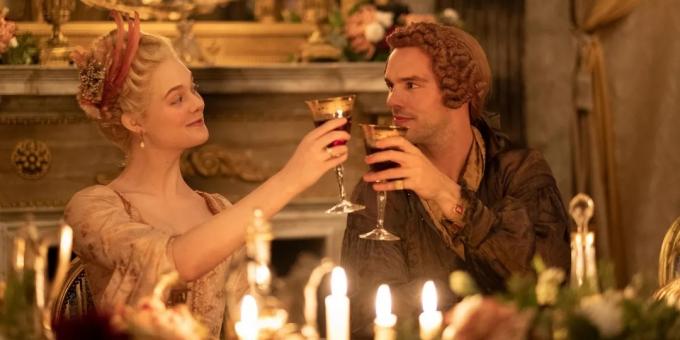
Already from one such introduction, many can catch fire. But you need to take a closer look at this series. It's not about history at all, or even about Russia. Such a grotesque 18th century entourage will suit almost any European country: Great Britain in “Favorite"Was not very different.
Only here in "Velikaya" there are not even historical figures. The fate of Catherine herself very approximately follows the life of the prototype. And Peter III is not at all a grandson, but the son of Peter the Great. And his main problem is complexes in front of his parents. He either wears a mother's necklace or a skirt in general, then he tries to come up with a sonorous title. In addition, the emperor is at war with the Swedes. In general, only the name remained of the real person.
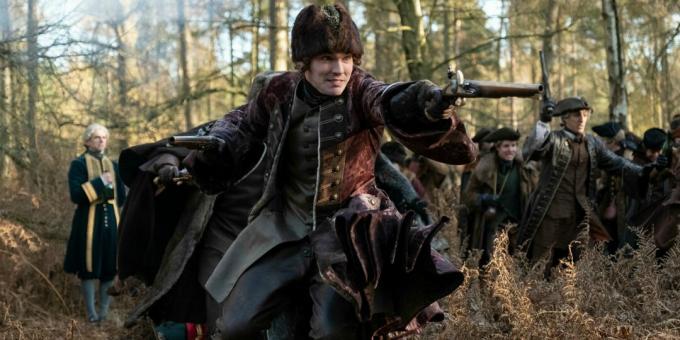
There is no need to talk about the rest of the heroes. There is, for example, a character named Orlo. This is probably an allusion to Count Orlov. True, he is played by Sasha Dhavan - an Englishman with Indian roots. He was all seen as the Master in the last season. "Doctors Who». It is also easy to spot dark-skinned heroes, even among churchmen.
Connoisseurs may find some references to real historical figures. A couple of famous facts and legends are also remembered. For example, about Ivan VI, who was hidden in a secret room. But these are nothing more than funny hints to make it more interesting to watch. Everything else is frank and deliberate fiction. This is even specifically announced in the splash screen: under the title there is a footnote "sometimes true story."
Reading now🔥
- 5 Reasons to Watch the Solar Opposites animated series from the author of Rick and Morty
Private struggle instead of country life
Almost all the action of "The Great" takes place in the palace and its surroundings. But one should not think that the life of the emperor's entourage is a reflection of the order of all of Russia. On the contrary, this is just a private story, with all its might moving away from scale.
The main plot is devoted to the struggle of progress against the ossified order. And that is why both sides are shown here so grotesquely. If in "Favorite" rough entertainments like throwing fruit at a person were only episodic insertions, then the series builds on this the whole entourage. There is, perhaps, not a single general scene where no one is fighting in the background, does not drink or does not practice having sex.
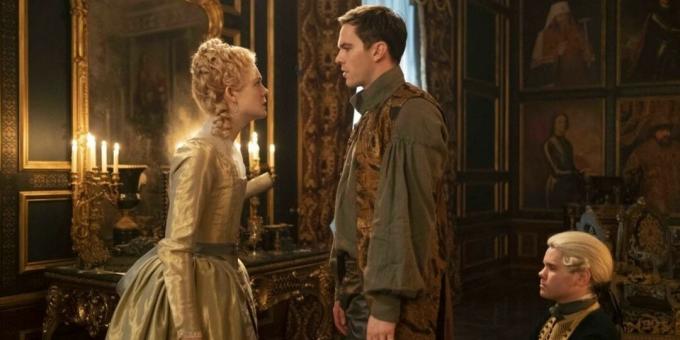
Women do not read here, because it is not accepted, men - because it is “not manly”. Only Catherine and her associates love literature. Everyone indulges the whims of the emperor, who really only wants to have fun with women. Peter literally in every episode talks about his own or someone else's genitals.
It was with this that Catherine decided to fight. And after the first comic episodes, demonstrating the savagery of the inhabitants of the palace, the story becomes more harmonious. The heroine develops a plan and assembles a team that will stage a coup. Her companions are strange, but charismatic: the overly sarcastic servant Mariel, the lover of the Empress Leo Voronsky and the cowardly Orlo.
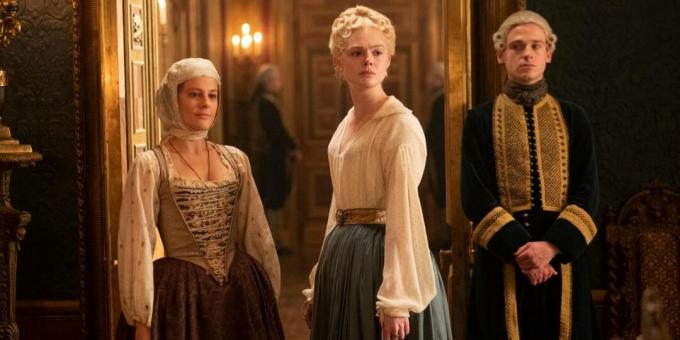
Further, the plot develops into an excellent political comedywhere everyone has their own interests and everyone is trying to outplay opponents. By the second episode, the newly-made husband and wife are thinking about killing each other. Then the picture becomes even more complicated: new political forces, personal interests and much more intervene.
By the way, this leads to a very interesting thought: even those who are fighting with all their might for progress and that "bright future" are often forced to use the dirtiest methods.
Quite unexpected turns also play a role: often the action literally develops into a comedy of the absurd.
Black humor instead of satire
Perhaps the most important thing to know about the show is that it shouldn't be watched by those who don't like rough and rough. jokes.
Peter's constant vulgar remarks are just the tip of the iceberg. Here, every second bed scene turns into a trash attraction, up to a combination of talking about the mother and oral sex. Of course, one cannot do without rumors about Catherine's connection with horses - one of the most popular obscene legends.
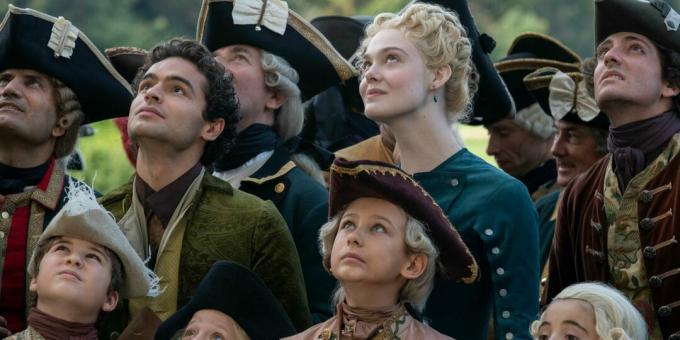
The mummy of the emperor's mother is in plain sight. A huge statue of Peter the Great depicts him sitting on a bear. Some of the characters seem to have come from the troupe's comedies "Monty python": Like Aunt Elizabeth, who trains butterflies and talks to fish.
The absurdity of what is happening is also emphasized by the soundtrack: balalaikas and choral chanting of "Kazachka" are interspersed with jazz motifs, and each episode ends with some modern track.
But strangely, the best part of the humor is hidden in the dialogue, not in the wild setting of the feast. And (according to the precepts of the hardest comedy series) there are no taboo topics here. Religion, war, death, disease - everything will be joked very rudely. And most of the time it's funny.
Alas, it is unlikely that even a deliberate refusal to comply with at least some historical events will save this series from criticism. But in reality, the project can only offend those who believe in its veracity.
As for the rest, Tony McNamara simply took the well-known theme of the confrontation between the old and the new, threw a huge portion of harsh jokes into it and placed it in an environment somewhat reminiscent of Russia in the 13th century. It turned out cool and fun.
Read also🎥🎞👑
- 13 films that predicted the coronavirus pandemic and more
- 20 films about women to admire
- 12 historical films striking in their authenticity
- 12 best historical TV series
- 25 of the best puzzle movies for real scholars



